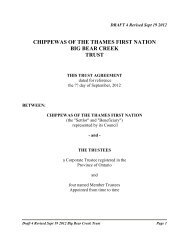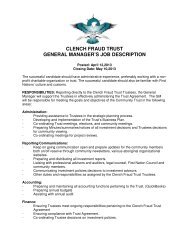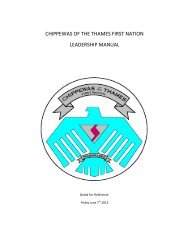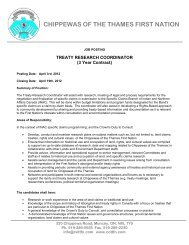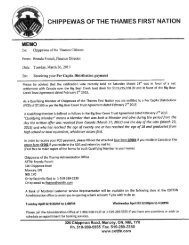CHIPPEWAS OF THE THAMES COMMUNITY STORY - Cottfn
CHIPPEWAS OF THE THAMES COMMUNITY STORY - Cottfn
CHIPPEWAS OF THE THAMES COMMUNITY STORY - Cottfn
Create successful ePaper yourself
Turn your PDF publications into a flip-book with our unique Google optimized e-Paper software.
everyone had what they needed. If one of us was ―down‖, the rest would always help<br />
out.<br />
c. We were very affectionate in our families, lots of hugs and encouragement and warm<br />
feelings.<br />
d. We had traditional knowledge and teachings that were taught in the home. Our young<br />
people grew up knowing where they came from, and they learned to see themselves<br />
as valued and contributory members of a larger whole. From these teachings they got<br />
a code to live by and wisdom to deal with life‘s challenges. Most of all we felt deeply<br />
connected to each other. We also had a sense of purpose and direction for our life,<br />
and we felt responsible to our families. We were willing to sacrifice and work hard for<br />
our families.<br />
e. We had a traditional knowledge of medicine available to use for healing. Healing was<br />
a normal part of living.<br />
f. We lived close to the land. Our livelihood depended on a deep and continuous<br />
relationship with nature. We had to listen and learn from nature from our earliest<br />
years. What we learned from nature becomes part of out spiritual life, we well as the<br />
means to our survival.<br />
g. Residential schools broke up our strong families, cultural connections, and forced us<br />
to become disconnected from nature. When these disconnections occurred, bad<br />
things started happening. Our people forgot about who they were. We began hurting<br />
each other and ourselves. We forgot how to live a healthy life. We lost the knowledge<br />
on how to effectively parent our children. These things are not permanently lost, but<br />
they are hidden, and we need to get them back.<br />
h. Life for young people (unmarried young men and women) was very structured and<br />
disciplined. Everyone had their work to do everyday, and no one was allowed to stray<br />
far from the watchful eye of elder family or community members. Behaviour was<br />
strictly monitored, and young people were expected to be respectful, truthful,<br />
courteous and kind to everyone (i.e., to follow the sacred teachings). As a result, our<br />
young people remained much more a part of our families then they are today, and<br />
they had far less trouble in their lives.<br />
i. Many adult volunteers gave lots of time to teach youth a wide range of knowledge,<br />
talents and skills, ranging from arts and crafts (such as sewing, beading, weaving,<br />
Chippewas of the Thames Community Story<br />
October 2011<br />
19



